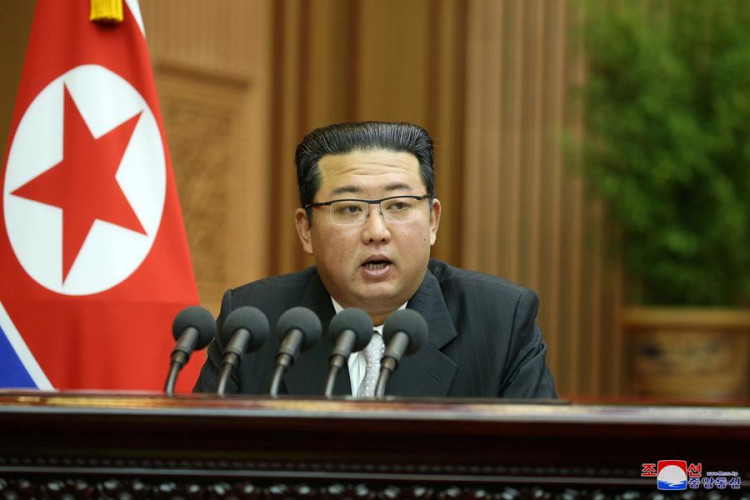North Korea claimed on Wednesday that 1.4 million young people had volunteered to join or re-enlist in the Korean People's Army (KPA) following what it described as a "provocative" drone incursion by South Korea. The North's state-controlled Korean Central News Agency (KCNA) accused Seoul of violating its sovereignty, bringing tensions on the Korean Peninsula "to the brink of war." This massive mobilization marks one of the most significant escalations in the region in recent years.
The surge in enlistments was reported to have taken place over a brief two-day period, according to KCNA, with youth league officials, students, and workers signing up in droves. The move comes after North Korea accused the South of sending drones over Pyongyang that allegedly distributed a large volume of anti-North leaflets. In response, the North blew up inter-Korean roads and rail lines on its side of the border on Tuesday, and warned that the South would "pay a dear price."
"If a war breaks out, the Republic of Korea [ROK] will be wiped off the map. Since it wants war, we are willing to put an end to its existence," KCNA declared, highlighting North Korea's readiness to engage in military conflict should tensions escalate further. Such rhetoric is consistent with the North's history of fiery statements, particularly during periods of heightened confrontation.
The South Korean government has not commented directly on the latest enlistment claims. However, Seoul's defense ministry reiterated that any attack from North Korea threatening the safety of South Korean citizens would result in "the end of its regime." South Korean and U.S. officials met later on Wednesday, along with Japan's vice foreign minister, to condemn Pyongyang for "intentionally raising tension" over the drone allegation and for sealing the border between the two Koreas.
Pyongyang's state media characterized the mass enlistment as a unifying force within the country, with KCNA emphasizing that the recruits were motivated by a desire to "punish the scum who committed a hideous crime" and to defend North Korea's socialist system. The official narrative framed the surge as an impassioned response to South Korea's "military gangsters" and a commitment to "plunge the enemy into an abyss of ruin."
Kim Yo Jong, the sister of North Korean leader Kim Jong Un, delivered a stern warning, saying that if provocations continue, "the consequences will be horrible." She claimed there was "clear evidence" linking South Korea's military to the drone flights, suggesting that the incursion represented a direct violation of North Korean territorial integrity. "The South Korean military should be prepared to face severe retaliation if such actions occur again," she added.
North Korea's large-scale mobilizations are not new. The regime often reports mass enlistments during periods of heightened geopolitical tension. For instance, in 2017, North Korea claimed that nearly 3.5 million people volunteered to join the military in response to U.S. pressure. Last year, state media similarly reported 800,000 enlistments following an escalation in hostilities with the United States.
Despite North Korea's claims, verifying these figures is challenging due to the isolated and tightly controlled nature of the regime. Analysts have often questioned the credibility of such enlistment numbers, viewing them as a form of state propaganda designed to project strength and unity.
Seoul has denied any responsibility for the alleged drone flights, but its Joint Chiefs of Staff later issued a statement that they could neither confirm nor deny North Korea's accusations, leaving the matter unresolved. There is speculation in South Korea that the drones may have been operated by activists, as anti-North organizations have previously launched leaflets using balloons.
U.S. Deputy Secretary of State Kurt Campbell commented on the developments, expressing concern over North Korea's aggressive stance. He noted that North Korea's behavior fits a pattern of heightened rhetoric aimed at consolidating domestic unity and justifying further provocations. Campbell also highlighted the North's support for Russia in Ukraine, saying there were signs of "enhanced material support" from North Korea that was impacting the battlefield. The U.S. is continuing to evaluate these reports, he said.
In an effort to address North Korea's recent actions, the United States, Japan, and South Korea announced the formation of an 11-nation team to enhance monitoring of sanctions enforcement against North Korea. This new initiative follows a series of blocked attempts at the United Nations to extend sanctions due to vetoes by Russia and China.
Observers suggest that North Korea's recent actions may also be aimed at diverting attention from its domestic challenges. According to an official from Seoul's unification ministry, Pyongyang may be exaggerating the severity of tensions to foster internal unity and build a pretext for further provocations. Park Won-gon, a professor at Ewha Womans University in Seoul, noted that North Korea appears to be using the drone incident as part of a broader strategy to sever cross-border ties and solidify a "two-state" system.
The current flare-up underscores the fragile state of inter-Korean relations. In early 2023, Kim Jong Un declared South Korea a "primary foe" and insisted that unification was no longer an objective. Since then, North Korea has taken significant steps to cut off inter-Korean relations, even as the two Koreas remain technically at war. The 1950-53 Korean War ended in an armistice, not a peace treaty, and tensions remain high.





